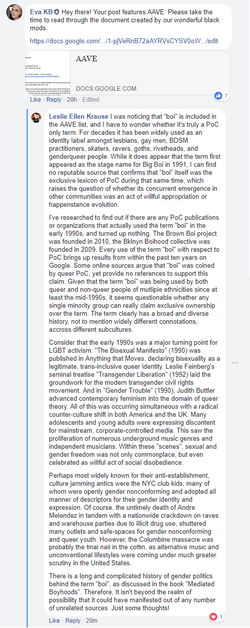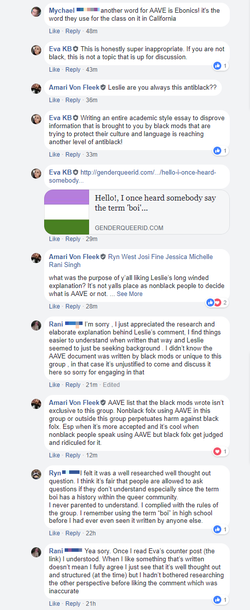
Boi Fancy
Researched by Leslie E. Krause
June 17, 2018
Debunking the Myths
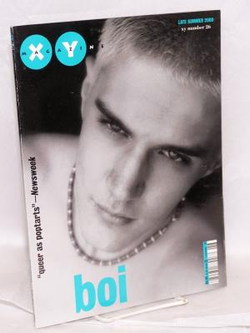 The purpose of Boi Fancy is to critically examine the etymology of the word "boi", including its multiple incarnations and interpretations within a diverse array of subcultures. I hope to dispell the lingering misconceptions that black people are solely responsible for coining the word "boi" and that the word "boi" was assimilated from the vernacular of black people (AAVE).
The purpose of Boi Fancy is to critically examine the etymology of the word "boi", including its multiple incarnations and interpretations within a diverse array of subcultures. I hope to dispell the lingering misconceptions that black people are solely responsible for coining the word "boi" and that the word "boi" was assimilated from the vernacular of black people (AAVE).
Not only are these claims rooted in ignorance, but they conspire to rob LGBTQ communities of a heritage spanning upwards of 25 years. Queer-erasure is now being advanced under the guise of racial justice by radical PC authoritarians -- albeit a thinly veiled attempt to silence the personal narratives of a diverse collective of queer people through falsified historic revisionism, thereby retroactively denying queer people the right to self identity.
For decades queer folks and their allies have been heralding "boi" as a contempory, counter-cultural identity label. Despite its longstanding use within a variety of social and political arenas ranging from feminism, lesbianism, transgenderism, and even underground music and fashion scenes dating to the mid-1990s, the word is now being surreptitiously co-opted by black people to the exclusion of all other marginalized and disenfranchized social classes.
Once a word is declared AAVE, regardless of merit, it cannot be deliberated since black people are immune to scrutiny. In short, any attempt to challenge a patently erroneous or fraudulent assertion, is deemed an act of "white supremacy". Such intellectual dishonesty is invoked to preclude or shutdown critical thought whenever it is convenient.
“As researchers point out, a core feature of authoriarianism in general, is a worldview in which a large portion of the social world is seen as threatening. Brophy and Peterson suggest that perhaps the PC authoritarians' support of policies involving censorship and harsh punitive justice is driven by the desire to shield themselves from any discomforting experiences. Their higher levels of compassion may cause them to advocate for those who are vulnerable, sympathizing more with an in-group at the bottom of a dominance hierarchy.” (Kaufman, 2016)
For example, I was recently barred from an an LGBTQ forum merely for questioning whether the word "boi" could have emerged in multiple subcultures simultaneously. Despite offering a sensible and unbiased perspective, in hopes of opening a constructive dialog, I was instead promptly accused of being "antiblack" and told "this is not a topic that is up for discussion".
Not surprisingly, the most vocal opponent to my inquiry was — a non-black moderator. Even after I respectfully stepped away from the conversation as instructed, this moderator continued lodging criticism after criticism toward me, until finally banning me 24 hours later.
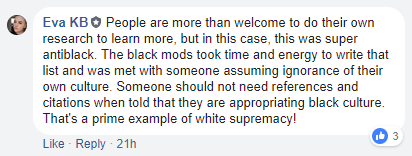
Virtue signalling is a common tactic employed by privileged white folks, particularly with respect to cultural appropriation. Their appeal to righteous indignation and appeal to sanctity feeds into a sense of superiority and entitlement, allowing them to speak over the voices of both black people and white people alike while imposing strict penalties for any perceived violations.[2][3]
“The salient feature of an Appeal to Sanctity is that it is employed as a shield against the critique of an idea or even a wholesale ideological critique.... Righteous indignation undermines civil discourse and often corrodes efforts aimed at reasonable compromise.” (Longsine & Boghossian, 2012)
~ ~ ~
This project is a culmination of many weeks of research into the subject of intersectional identity politics within the LGBTQ community. I hope these findings will be empowering and affriming for LGBTQ people on their journey of self-discovery, while ensuring greater awareness, sensitivity, and consideration about the breadth of language that we have available for self-identification.
~Leslie E. Krause
- Scott B. Kaufman, "The Personality of Political Correctness", Scientific American (Nov 20, 2016)
https://blogs.scientificamerican.com/beautiful-minds/the-personality-of-political-correctness/ - Mark Judge, "Are You Guilty of Virtue Signaling?", Acculturated (Jan 4, 2016)
https://acculturated.com/virtue-signaling/ - Gary Longsine & Peter Boghossian, "Indignation Is Not Righteous", Skeptical Inquirer (Sep 27, 2012)
https://www.csicop.org/specialarticles/show/indignation_is_not_righteous
A Word of Multiple Stories
How exactly did the word "boi" transform from a value-neutral term with a rich history across many subcultures in the 1990s to a closely guarded black-only identity as recently as 2010?
Several organizations founded by and for QPoC certainly use the word "boi" in their title and mission statements. Nonetheless, all four emerged within only the span of the past decade:
- Boi Society (2013)
http://boisociety.tumblr.com/ - The Real Bois Talk (2011)
http://realboiztalk-blog.tumblr.com/ - Brown Boi Project (2010)
https://www.facebook.com/brownboiproject/ - bkln boihood (2009)
https://www.facebook.com/bklynboihood/
In addition, there is an overwhelming shortage of publications to establish that the word "boi" was ever unique to or derived from AAVE. It does not seem to exist in any black-authored magazines, journals, news articles, or books prior to 2000. If "boi" originated in black culture as we are told, then its absence from African American literature does not stand to reason.
As the following sections illustrate, the word "boi" was actually a cross-cultural colloquialism, long before being subsequently endowed with racial implications by black people.
1. Boi in lesbian spaces
It is uncertain how or when the word "boi" became an accepted identity for masculine-of-center lesbians. But, the practice may have been inspired by urban drag king troupes during the 1990s. Female performers would label themselves "boi" both for ironic effect and as an expression of their resistance to and rejection of essentialist notions of manhood[1][2][3].
The choice of lesbians to adopt this same moniker, therefore, not only articulated a performative deconstruction of masculinity, but also as a dis-identification with traditional lesbian practices and identifiers[4]. To some lesbian feminists, boihood emphasized a dissolving or challenging of fixed ideas of man vs. woman as well as abandoning the label butch (a phenomenon known as "butch flight").[5].
In a 2001 study, Human Rights Watch noted, "Young lesbians do not experience sexism and homophobia as separate events; instead, the two forms of harassment are mutually reinforcing. It is simply impermissible for girls to reject boys. Thus lesbians, and particularly lesbians who identify as, or are perceived to be ‘butch’, are punished for violating gender norms and because of their sexual orientation. It is not surprising then that lesbians are frequently threatened with being raped, an act of violence aimed at achieving literal sexual domination."[6]
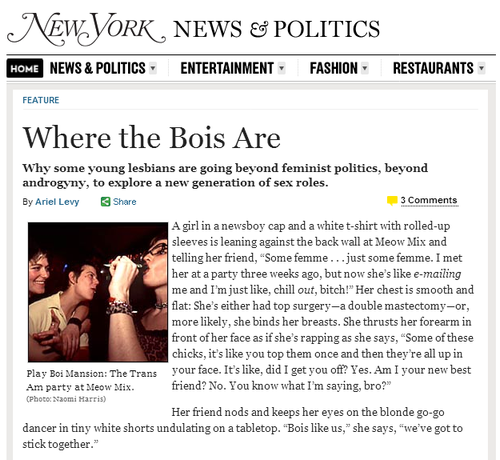
Interestingly, the term itself stuck and grew steadily in popularity amongst lesbians during the early 2000s, even eclipsing other variations of the word[7][8]. Today, it is frequently found in lesbian literature, forums, and blogs[9][10] and also serves as a self-identification label for many younger lesbians[11][12]. It still finds use in drag king culture as well[13][14].
- Christine Ramsay, "Making It Like a Man: Canadian Masculinities in Practice", Wilfred Laurier University Press (2011)
- Julie Louise Hanson, "Masculinities in Drag", University of Adelaide (2007)
- Kathryn Hobbs PhD, "Performative Tensions in Female Drag Performances" (2013)
- Levy, A. "Female Chauvinist Pigs: Women and the Rise of Raunch Culture". Simon and Schuster (2006)
- Jean Bobby Noble, "Sons of the Movement: FtMs Risking Incoherance on a Post-Queer Cultural Landscape", Women's Press (2006)
- "Hatred in the Hallways", Human Rights Watch (2001)
https://www.hrw.org/reports/2001/uslgbt/Final-08.htm - "Where the Bois Are", New York Magazine (Jan 5, 2004)
http://nymag.com/nymetro/news/features/n_9709/ - Jim Elledge, "Queers in American Popular Culture, Vol. 2", Praeger (2010)
- Sacci Green, "Me and My Boi: Queer Erotic Stories", Cleis Press (June 2016)
http://www.simonandschuster.com/books/Me-and-My-Boi/Sacchi-Green/9781627781398 - Kit Lix, "Lesbian Boi Tales, Vol. 1", CreateSpace (Jul 8, 2012)
- Sarah Herbert MD, "Butch/Femme, F2M, Pregnant Man, Tranny-Boi: Gender Issues in the Lesbian Community" (Jan 2010)
https://www.tandfonline.com/doi/abs/10.1080/19359700903407973 - Fran Hayden, "The Great Big Lesbian Dictionary", DivaMag (Jan 10, 2013)
http://www.divamag.co.uk/Diva-Magazine/Dating/The-great-big-lesbian-dictionary/ - Xavier Lemoine, "Proliferating Masculinities: New York Drag King Shows", Université de Nantes (Oct 2011)
http://www.kremwerk.com/upcoming/2016/5/28/kings-a-drag-king-show- - "Revamped Boi Zone at Tribeca" (April 26, 2018)
http://www.canal-st.co.uk/news/revamped-boi-zone-at-tribeca
2. Boi as transmasculine identity
In many queer spaces, the term "boi" is regarded as an umbrella transmasculine gender identity encompassing both FTM transsexuals and genderqueer AFAB people, alluding to a personal sense of detachment between one's sexuality and one's gender.[1][2]
Indeed, the very notion that masculinity is neither static nor even tied to birth assigned sex, proves fundamental to queer theory itself:[3]
“One of the recent developments in Gender Theory is to recognize that it is really not possible to speak to a single 'masculinity' or 'femininity', even in a specific culture at a specific time. Once we notice that there are multiple forms of masculinity evident at any given moment, some of which do not even correspond to biological sex, then it becomes easier to realize that gender is not particularly coherent or static, that what constitutes the masculine can not only vary among the individuals in a given space but can also change over time, both for the culture and the individual. Because masculinity does not exist transcendentally but only in its enactment by individuals, then masculinity – any version of masculinity – is not so much a thing or a quality as a process, which means that it can mutate or drift or even fail” (Dennis W. Allen, 2008)
The peer pressure for younger queer women to transition can prompt some to adopt the label "girlfag" or "boi" to signify that they do not identify as a butch lesbian, but rather as a gay man trapped in a woman's body.[4] In the case of queer trans men, "boi" may simply denote a youthful stage of transition, analogous to a twink.[5]
The "tranny-boi" and "boychick" identifiers, in particular, are concerned with deconstructing hegemonic archetypes of manhood while embracing categorical indeterminancy and incoherence within the various incarnations of masculinity.[6][7]
- Merritt Linden, "Radical to Raunch: Articulating and Anticipating Contempory Lesbian Feminism", Utrecht University (Feb 27, 2008)
- Bladerunner, "Boi's", news:soc.subculture.bondate-bdsm (Jul 30, 2000)
https://groups.google.com/d/msg/soc.subculture.bondage-bdsm/M0f_n8NuiBU/gOD3L1Y0VlMJ - Dennis W. Allen, "Bois will be Bois: Masculinity and Pedagogy in the Gay and Lesbian Studies Classroom", Palgrave Macmillan UK (2008)
- "Women Who Love Gay Men feat. Bianca James", The Tyra Banks Show (2006)
https://www.youtube.com/watch?v=ti1W-__ejV8 - Chris Crain, "Who's the Fairest Twink of Them All", Bay Times (Nov 22, 2007
https://web.archive.org/web/20120329004401/http://www.sfbaytimes.com/index.php?sec=article&article_id=7066 - Giffney & O'Rourke, "The Ashgate Research Companion to Queer Theory", Routledge (Dec 28, 2009)
- Kristen Eckstrand, "Lesbian, Gay, Bisexual, and Transgender Healthcare", Springer (Feb 17, 2017)
3. Boi as synonym for ladyboy
During the late 90s, the word "boi" became increasingly synonymous with effeminate or androgynous male youth including ladyboys and Nancy boys, while avoiding implications of crossdressing[1]. It was effectively a precursor to the present designation of "femboy".
The word also qualified a variety of alternative fashion aesthetics such as raver boi, goth boi, glitter boi, or glam boi which were coming into vogue across underground music and fashion scenes at this time[2][3][4][5]. In most cases, however, it evoked an androgynous sensibility[6].
A variety of male singers and actors were adopting a feminized mode of dress and behavior at the time, the most influential being Brian Molko (Placebo) and and Jonathan Rhys Meyers (Velvet Goldmine). Together, these two genderbending icons propelled the ladyboy persona into the mainstream consciousness[7][8].
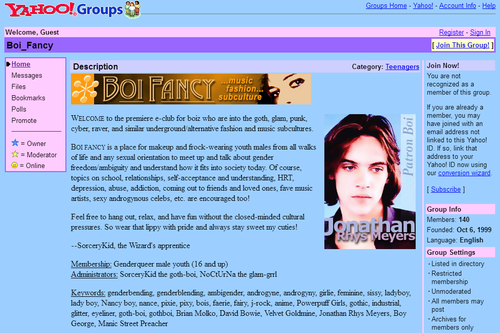
The "Boi_Fancy" listserv, launched in 1999, was the first and foremost online community for genderbending male youth from all walks of life, catering to upwards of 140 members[9].
The group and its young membership took the lead at embracing novel identity labels like ambigender, genderqueer, genderfluid as well as the ideologies of transfeminism. However, “boi” still conveyed an overt defiance of social norms that youth of the day craved — almost synonymous with queerness, it signaled not only unbridled gender nonconformity, but a liberation from the prevailing cissexist and heterosexist mandates.
- Seth J. Fogarty, "Re: Boi's", news:soc.subculture.bondage-bdsm (July 29, 2000)
https://groups.google.com/d/msg/soc.subculture.bondage-bdsm/M0f_n8NuiBU/IhKv23H90-YJ - tristen, "Glitter & Glam boi in DC", news:alt.gayteen.personals (Jul 1, 2000)
https://groups.google.com/d/msg/alt.gayteen.personals/2Jun2PRmqF0/3AHUTUn-zhwJ - Frankie, "Re: garage music", news:alt.rave (Jun 10, 1999)
https://groups.google.com/d/msg/alt.rave/H1nVgvSFukw/sj7Mxbi4fZwJ - Montana Raver Boi, "Re: I'm going to the bookstore" news:alt.rave (Apr 28, 2001)
https://groups.google.com/d/msg/alt.rave/W1PsCxMx-g4/nIjLFBvPXZ0J - Bijan, "Re: guys and glitter??" (Jan 3, 1999)
https://groups.google.com/d/msg/alt.rave/Pw7rIOkGsws/VIZRcejL9GkJ - "Goth Slang", The Television Wiki (Dec 8, 2005)
http://www.tvwiki.tv/wiki/Goth_slang#B - Izzy, "Placebo: The Bois are Back", Philthy Mag (Oct 31, 2011)
https://www.philthymag.com/placebo-the-bois-are-back/ - rosie, "Re: Black Fingernails", alt.music.placebo (Apr 14, 1999)
https://groups.google.com/d/msg/alt.music.placebo/aZxEKzmo2oM/tsH7NpFyGCgJ - "Boi_Fancy: The Club for Pretty Boiz" (Captured Apr 17, 2001)
https://web.archive.org/web/20010417041346/http://groups.yahoo.com:80/group/Boi_Fancy
4. Boi in the goth subculture
Arguably the most prevalent use of the word "boi" during the 1990s was within the gothic and industrial music scenes[1][2][3]. While there was no universal definition, the more common interpretations included "cute and possessive term of endearment"[4] and "a man who is not afraid to express the feminine sides to his look and personality"[5].
The earliest recorded use of the word "boi" on Usenet was on April 16, 1995 in the newsgroup rec.music.industrial[9].
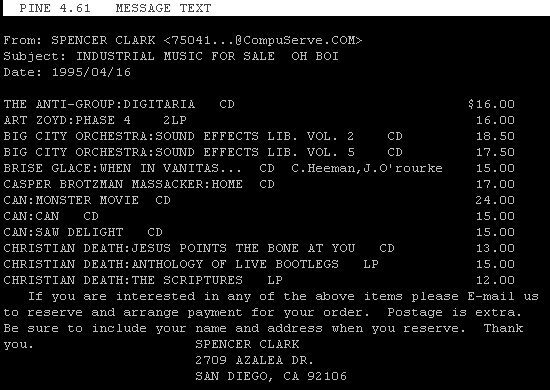
One person credits an IRC user named Nisa in #gothic for popularizing the word "boi" circa 1995. It is said that she ended many words with "i" for amusement; e.g. "oh mai!" or "hoi!"[6][7]. Another person attributes the increased popularity of "boi" to a user named GothFaeri on the alt.gothic.fashion Usenet group[8].
Similar diminutives like "lippie", "subbie", "femmie", "sparklie", etc. were quite commonplace in goth newsgroups, mailing lists, and chatrooms possibly due to the transliteration of "ie" as a fanciful and playful qualifier a-la pixie, faerie, cutesie or even Barbie[10][11][12].
On occasion, "boi" was interjected as an affectionate surname[13][14][15]. Similarly, "boi" functioned as an epithet or title[16][17][18]. On its own, "the boi" or "my boi" was a common shorthand for "significant other"[19][20][21], a practice which continued even outside of net.gothic circles.
Unfortunately, there is no consensus about when the word "boi" was attested in the context of goth subculture[22][23]. But reports indicate that it appeared as early as 1992-94, perhaps on Compuserve, AOL, or various BBSs[24][25]. At that time, it didn't have any implications of gender nonconformity; it was merely a synonym for guy, boyfriend, or husband[26][27].
The "Goth-Boi Babe of the Week" amateur model gallery was launched in April 1997[28][29]. Curated by Emmaleen of Nuclear Sky Productions, the site showcased portraits of self-proclaimed goth-bois that defied mainstream fashion conventions[30]. Since androgyny was highly regarded in the goth subculture and many of the featured models were openly gender nonconformng, it is conceivable that Goth-Boi Babe tranformed the earlier understanding of "boi" from an arbitrary young male into one with a distinctly feminine gender presentation.
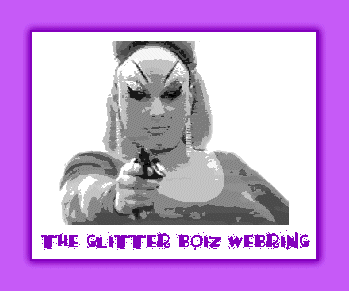
There were also two link exchanges devoted to goth-bois, including the "Glitter Boiz Webring" and the "ring of gothboiz"[31][32]. In addition, a spinoff amateur model gallery called "Baby Bat Site of the Week" accepted goth-boi nominations[33].
The author of the book "Mediated Boyhoods" fails to acknowledge these distinctive influences of the goth subculture, opting instead to credit only the rave, emo, and skate scenes[34].
- SomeFIERCE, "Goth chicks rule!!!", news:alt-gothic (Apr 4, 1997)
https://groups.google.com/d/msg/alt.gothic/BCwvgdarAPo/hQAxEtqw3roJ - Battty, ":mope:: this whole boi thing", news:alt-gothic (May 5, 2000)
https://groups.google.com/d/msg/alt.gothic/gtCA1Cornak/MKbViyX7FScJ - H Duffy, "Re: I hate beautiful goth bois", news:alt-gothic (Feb 10, 2000)
https://groups.google.com/d/msg/alt.gothic/DihQ65ErKeU/YYkh06Gvkx8J - filigree, "Re: The Definition of Boi", news:alt.gothic.fashion (Feb 24, 1999)
https://groups.google.com/d/msg/alt.gothic.fashion/6IYkuPOD924/sEARvX1zUnAJ - Juliette, "Re: The Definition of Boi", news:alt.gothic.fashion (Feb 23, 1999)
https://groups.google.com/d/msg/alt.gothic.fashion/6IYkuPOD924/xfoQWIa6GxUJ - Eileen, "Re: What's with this boi word?", news:alt.gothic (Jan 24, 2000)
https://groups.google.com/d/msg/alt.gothic/2itqW9qaANQ/JFZ-nAQLde4J - Eileen, "IRC HELL", news:alt-gothic (Jul 23, 1998)
https://groups.google.com/d/msg/alt.gothic/BxxkUPwpCPM/5WM8fFLX3SIJ - Sk8gundy, "Re: The Definition of Boi", news:alt.gothic.fashion (Feb 25, 1999)
https://groups.google.com/d/msg/alt.gothic.fashion/6IYkuPOD924/8MXWXImZ93YJ - Spencer Clark, "INDUSTRIAL MUSIC FOR SALE OH BOI", news:rec.music.industrial (Apr 16, 1995)
https://groups.google.com/d/msg/rec.music.industrial/_obYv7Q4ts8/uxxWM14V-kcJ - Useless, "Re: Oh, I'm in heaven", news:alt.gothic (Aug 5, 1998)
https://groups.google.com/d/msg/alt.gothic/r16Gkgt60k0/o48Cx7fIEVEJ - Suzy, "Re: Question on morality", news:alt.music.nin (Jan 10, 1999)
https://groups.google.com/d/msg/alt.music.nin/PD7qBbJeI-4/BtfUCDT3j6gJ - Jessie Black, "Re: S23 (Jessie Black) is Aimee the whore", news:alt.music.nin (Jul 20, 1996)
https://groups.google.com/d/msg/alt.music.nin/ssNnz4Jd3R8/4pOuntbMEIAJ - Roni, "Re: alt.gothic.pretentious.ladies", news:alt.gothic (Nov 28, 1997)
https://groups.google.com/d/msg/alt.gothic/3euFhI21XUg/FKqznFgJC5IJ - Ravenna, "Re: Token Goth Boy", news:alt.gothic (May 20, 1996)
https://groups.google.com/d/msg/alt.gothic/8pmMVSFQKpM/qKBY2Y4JxTkJ - Brian, "Re: Headcount", news:alt.gothic (Apr 1, 1998)
https://groups.google.com/d/msg/alt.gothic/jUutvNw5JRE/kXL18CSgaR4J - "SorceryKid the goth-boi" (Captured Jun 3, 2001)
https://web.archive.org/web/20010603174342/http://www.prairienet.org:80/~rkrause/SorceryKid/ - Arkady, "Re: The dead have come to claim a debt from me", news:alt.gothic (Jul 30, 1998)
https://groups.google.com/d/msg/alt.gothic/QC71klu0ex8/029lDGRSzgIJ - jet, "Re: Butch/femme", news:soc.bi (Mar 8, 1998)
https://groups.google.com/d/msg/soc.bi/DScwPct2dOc/v-pxVD4Y80EJ - victoria gwaed, "Re: Not Going to C5 Support Group", news:alt.gothic (Mar 31, 1999)
https://groups.google.com/d/msg/alt.gothic/2mtGPhRMCck/mdcBzobG91EJ - Twilight, "Re: POLL (primarily for heterosexuals", news:alt.gothic (Oct 22, 1997)
https://groups.google.com/d/msg/alt.gothic/fozC7GaKLEc/px61tDy_Xx8J - Lesley, "I got drunk last night", news:alt.gothic (Mar 7, 1999)
https://groups.google.com/d/msg/alt.gothic/_Gh0dlFWDLw/Ux5KTSMZEmQJ - greensea, "Re: The Definition of Boi", news:alt.gothic.fashion (Feb 24, 1999)
https://groups.google.com/d/msg/alt.gothic.fashion/6IYkuPOD924/03TNWt0rIacJ - Daednu, "Re: The Definition of Boi", news:alt.gothic.fashion (Feb 25, 1999)
https://groups.google.com/d/msg/alt.gothic.fashion/6IYkuPOD924/0NMUqVfonaIJ - Ratty, "Re: The Definition of Boi", news:alt.gothic.fashion (Feb 25, 1999)
https://groups.google.com/d/msg/alt.gothic.fashion/6IYkuPOD924/2jmNxkA-nhQJ - Basinke, "Re: The Definition of Boi", news:alt.gothic.fashion (Feb 24, 1999)
https://groups.google.com/d/msg/alt.gothic.fashion/6IYkuPOD924/RGfXqfZ822wJ - Vivian, "Re: The Definition of Boi", news:alt.gothic.fashion (Feb 24, 1999)
https://groups.google.com/d/msg/alt.gothic.fashion/6IYkuPOD924/azpehkmS5sUJ - Carrie, "Re: The Definition of Boi", news:alt.gothic.fashion (Feb 24, 1999)
https://groups.google.com/d/msg/alt.gothic.fashion/6IYkuPOD924/csIh940hsoMJ - emmaleen, "goth-boi babe of the year", news:alt.gothic (Mar 25, 1998)
https://groups.google.com/d/msg/alt.gothic/r_CPthFmtvA/ajpuhoui5HEJ - Kali Nichta, "Re: goth-boi babe nominationz", news:alt.gothic (Sep 10, 1997)
https://groups.google.com/d/msg/alt.gothic/LyZO1wpKEjU/X8_5L2uyBOAJ - Nuclear Sky Productions, "boi of the week" (Captured Feb 5, 2002)
https://web.archive.org/web/20020205113639/http://www.nycgoth.com:80/~gothboi/ - https://web.archive.org/web/20010802032823/http://www.bound-beauty.com:80/glitterboiz/
- https://web.archive.org/web/20001209165100/http://www.velvet.net:80/~phlaux/gothboiz/
index.html - Eiregoth, "Baby Bat of the Week Site", news:alt-gothic (May 19, 1998)
https://groups.google.com/d/msg/alt.gothic/LQqQCL902SM/HssvofQCQxoJ - Anette Wannamaker, "Mediated Boyhoods"; International Academic Publishers (Jan 4, 2011)
5. Boi as a submissive partner
In the context of BDSM, the word "boi" describes a female bottom (partner that performs in a submissive role) that is butch[1][2][3]. Since the late 90s, however, "boi" has evolved into a unisex label, refering to any submissive role-playing partner, regardless of gender[4][5].
Some BDSM practitioners draw an important distinction between a submissive and a slave. Within the power dynamic of dominance and submission, "A boy is told what to do. A slave does what he is told."[6] In a daddy/boy (or boi) relationship, therefore, the emphasis is on mentorship rather than obedience[7].
- "BDSM Education: Terminology for Newbies" (Captured Dec 25, 2003)
https://web.archive.org/web/20031225000303/http://www.bdsm-education.com/terminology.html - Katherine Hawks, "Re: thought for the day", news:soc.subculture.bondate-bdsm (Feb 7, 1999)
https://groups.google.com/d/msg/soc.subculture.bondage-bdsm/o4FYJUTLQMs/ZgKAfBshHhQJ - Laura Antanou, "Re: I AM the dear god!", news:soc.subculture.bondate-bdsm (Jul 28, 2000)
https://groups.google.com/d/msg/soc.subculture.bondage-bdsm/M0f_n8NuiBU/FUGX2W9XZAQJ - Masterwoof, "Re: I want you to force me to do...", news:soc.subculture.bondate-bdsm (May 29, 2003)
https://groups.google.com/d/msg/soc.subculture.bondage-bdsm/aIUIJpq5CuU/_nKXL_yyG2UJ - GoddessTammy, "your new wObsession-Goddess", (Nov 7, 2005)
https://groups.google.com/d/msg/soc.subculture.bondage-bdsm/DULSnngz7Fg/jWY2L4LzKu8J - Ambrosio, "Perverted Vocabulary" (Captured Apr 26, 2006)
https://web.archive.org/web/20060426080518/http://www.evilmonk.org/a/terms.cfm#boi - Jack Rinella, "The Difference Between Boy and Slave" (Captured Sep 10, 2003)
https://web.archive.org/web/20030910200359/http://www.fetishalliance.net/Stories/Slave_Stories/9313.htm
6. Boi in the femininist movement
Riot Grrrl was a grassroots feminist movement that emerged from the West Coast alternative and punk music scenes in the early 1990s, providing a DIY medium for women to express their views on social and political issues including rape, domestic abuse, abortion, and inequality in the media[1][2]. Young men that participated in Riot Grrrl activism were known as "Riot Bois", a custom which likely began soon after the movement's inception.[3][4][5]
- "How to Be a Riot Grrrl (or Boi)", wikihow (Mar 2018)
https://www.wikihow.com/Be-a-Riot-Grrrl-(or-Boi) - "Riot grrrl frequently asked questions" (Mar 5, 2001)
https://riotgrrrlonline.wordpress.com/riot-grrrl/riot-grrrl-faq/ - Erin Brennand, "Riot Grrrl Convention", news:alt-zines (May 13, 1996)
https://groups.google.com/d/msg/alt.zines/3E6KXwho6xk/PA8cIEGmcaQJ - Angel, "Re: warren beatty", news:alt.rock-n-roll.metal (Dec 24, 1998)
https://groups.google.com/d/msg/alt.rock-n-roll.metal.gnr/jIdaPigFkbM/yjdsmIlVojQJ - Anne Greenblatt, "Re: Team Dresch v 6.0 beta 7", news:alt.music.riot-grrrl (May 8, 1997)
https://groups.google.com/d/msg/alt.music.riot-grrl/ubLhoVviQd8/DDflxBLvJ6MJ
7. Boi as a gay male identity
The word "boi" first entered the lexicon of gay male youth in the late 1990s[1]. XY Magazine, a bi-monthly periodical, included the word alongside photos and stories of teen boys in a variety of columns such as "My Favourite Boi", "Hot Bois in Heat", "Dressed Up Bois", and "Boi Next Door" in addition to its cover artwork for the Late Summer 2000 issue[3][4].

Some younger gay men also adopted the label when seeking older romantic and sexual partners, known as daddies. Such a relationship can be similar, in effect, to that of dominance and submission, or simply for emotional and/or financial support.[5]
- Rona Marech, "Nuances of gay identities reflected in new language" (Feb 8, 2004)
https://www.sfgate.com/news/article/Nuances-of-gay-identities-reflected-in-new-2824367.php - "Remembering the hot young gay youth of XY Magazine" (Mar 20, 2015)
https://i-d.vice.com/en_uk/article/zmxzyw/remembering-the-hot-young-gay-youth-of-xy-magazine - David Zanes, "Dressed Up Bois", XY Magazine (Late Summer 2000)
https://www.amazon.com/Magazine-Young-Dudes-Summer-2000/dp/B005JYXJPU - Steven Underhill, "Boi Next Door", XY Magazine (Apr 2000)
https://www.amazon.com/Magazine-Young-Dudes-April-Wacko/dp/B005R3UMAI - Henry Scott, "Gay Bois and the Daddy Hunt", WEHOville (Feb 9, 2017)
https://www.wehoville.com/2017/02/09/daddy-dearest-gay-bois-and-the-daddyhunt/
From Big Boi to Black Slang?
When Antwan Patton joined forces with Andre Benjamin to form the rap duo 2 Shades Deep in high school, they adopted the monikers Black Dog and Black Wolf. It wasn't until they were signed by LaFace Records after their senior year, that Antwan changed his stage name to "Big Boi", a paradoxical celebration of his small stature[1]. OutKast's first single, "Player's Ball, premiered in 1994 and ranked number one on the Billboard rap charts for six weeks[2].
In the book "Mediated Boyhoods", the author speculates that Antwan adopted this stage name as reclaimed slur. Yet, there is no credible evidence to support such a hypothesis.
In a 2010 interview, Antwan attributes his choice in stage name to playing football in high school combined with his love for apple pies and ice cream[3]. However, the word "boi" itself never appeared within the lyrics or titles of any OutKast songs prior to 2003. Nor was the word even a part of Antwan's personal vocabulary.
Hence, this contravenes the notion that Antwan was conveying some deeper socio-political message through the stage name Big Boi, beyond its unique and novel brand appeal.
- "Getting to Know Big Boi", FemaleFirst (Jun 29, 2010)
https://www.femalefirst.co.uk/music/features/Getting+To+Know+Big+Boi-12437.html - Melissa Walsh, "Antwan Patton Black Biography" (2005)
http://powerplaycommunications.writersresidence.com/samples/antwan-patton - Gerrick D. Kennedy, "Big Boi Talks Kate Bush", Los Angeles Times, (Sep 29, 2010)
http://latimesblogs.latimes.com/music_blog/2010/09/big-boi-promises-new-outkast-album-even-if-the-label-doesnt-always-understand-the-music.html
1. Researching Rap Lyrics
One means to glean insight about the history of the word "boi" in black culture, is by studying its prevalence within rap lyrics. Since the 1980s, hip hop music has become a near-ubiquitous artistic medium throughout inner-city black communities. Rap artists use rhymes layered over beats to communicate ever-changing attitudes and ideas.
For this purpose, I consulted the Original Hip Hop Lyric Archive, arguably the most comprehensive database of its kind, for insight into changing lyrical trends. With the aid of Google search engine, I enumerated all occurencess of the word "boi" by release year. I excluded call outs and songs recorded by Outkast. I then plotted the results on a graph.
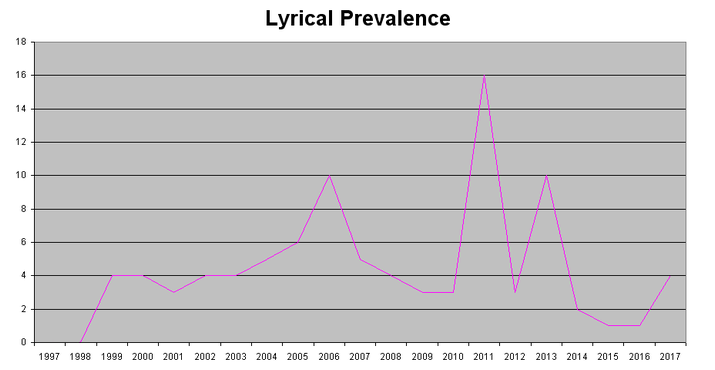
According to OHHLA, the first appearance of the word "boi" was in 1999. Two spikes in usage occured between 2011 and 2013, but those were attributed to a series of songs featuring rapper Big Sean (for whom the word "boi" was, evidently, a very common drop).
It is important to note that most of the lyrics on OHHLA were voluntarily transcribed and submitted by fans. As a result, they are a) more prone to errors and ommissions and b) more likely to reflect the spelling conventions of the contributors themselves.
The first confirmed appearance of the word "boi" as a song title was "Dope Boi Fresh" by Attic Crew released in 2002. Despite the numerous lyrics purported to contain the word "boi" prior to that year, the only song to actually have published lyrics (verifiable from liner notes) was "Look at Me" by E-40 released in 1999, and it used the conventional spelling of "boy".
Published Lyrics:
E-40 - Look at Me (1999)
Unpublished Lyrics:
Dirty - Country Versatile (1999)
Yukmouth - Rolex Rulez (1999)
Crooked Lettaz - Chicken and Swine (1999)
Mac Mall - Don't Move (2000)
Half-A-Mill - Quiet Money (2000)
Snoop Dogg - Down 4 My N's (2000)
Bone Thugs N Harmony - Weed Song (2000)
La Chat - Don't Sang It (2001)
Oomp Camp - Knuckle Up (2001)
Missy Elliott - Nothin Out There (2002)
Attic Crew - Drop Boi Fresh (2002)
Given the numerous ambiguous and likely erroneous transcriptions, it would appear that the word "boi" was not the favoured lexicon of rap artists at the time.
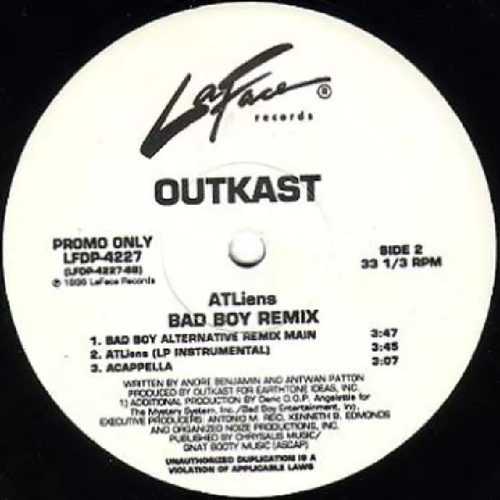
Furthermore, OHHA purports a consistent use of the word "boi" in the lyrics of Outkast songs, yet most albums supplied only track listings and production credits. Those songs to actually have published lyrics (verifiable from liner notes) used the conventional spelling of "boy".
Published Lyrics:
Flip Flop Rock (Speakerboxxx, 2003)
Spaghetti Junction (Stankonia, 2000)
B.O.B. (Stankonia, 2000)
Synthesizer (Aquemini, 1998)
West Savannah (Aquemini, 1998)
Mamacita (Aquemini, 1998)
Unpublished Lyrics:
Jazzy Belle (ATliens, 1996)
Two Dope Boys (ATliens, 1996)
Wailin (ATliens, 1996)
Phobia (Higher Learning, 1995)
Southernplayalisticaddillacmusik (1994)
2. Researching Newsgroup Posts
Secondly, I decided to document the linguistic trends of hip-hop music fans themselves. After all, an unmoderated online message forum can provide direct insight into the ever-changing vocabulary of musicians, producers, and listeners alike.
To this end, I downloaded an archival copy of the rec.music.hip-hop newsgroup from the Wayback Machine. I devised a Linux command-line script to extract posts containing the word "boi", tabulating every occurence by author. References to "Big Boi" were automatically excluded. The results were then plotted on a graph.
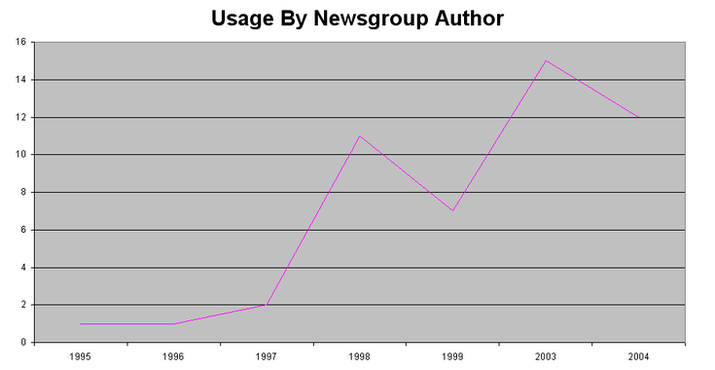
The first mention of "boi" occured on April 23, 1995, exactly one week following the post in rec.music.industrial. Only a single user, Steve Jackson, was using that spelling till late 1997. Curiously, in a post dated two months prior, Jackson used the conventional spelling of "boy".
Since the highest incidence of the word "boi" occured in 2003, I compared its usage against the conventional spelling. I recorded a total of 1006 posts containing the word "boy", yet only 66 posts containing the word "boi". Such a remarkable disparity would suggest that the word "boy" was still in widespread use amongst the vast majority of hip-hop music fans.
Additonally, I examined the usage of the word "boi" by author between 1995 and 1999. I recorded a total of 142 posts, nearly 80% of which were by the author Steven Jackson.
3. Final Thoughts
It seems evident that the word "boi" was altogether a novelty prior to 2002. At least insofar as rap artists and fans of hip hop music were concerned, it barely even functioned as slang moreless a traditional vernacular of black people.
Plotting a Linguistic Roadmap
The modern English word "boy" can be traced to 13th century England and Scotland, having undergone multiple spelling variations, including boy, boye, boi, and boie. The pronunciation, likely of Anglo-Norman influence, is presumed to be /bwe/ or /bo'-ay/ or /boo'-we/ amongst several regional dialects.
The common sense of the word in Middle English was that of contempt, except in situations of implicit servitude or inferiority which gained wider use through trade in colonial territories[1]:
- servitude, with respect to a male attendant, labourer, slave, or serf;
- inferiority, with respect to a male of lower birth-rank or social order; or
- contempt, with respect to a male knave, harlot, devil, or churl
In the following poem from "Arther and Merlin", the second use can be noted:
“Wawain hadde wip him, so y wene,
Of orped boies pusandes fiftene.”
This excerpt from "William of Palerne" (circa 1350) is an example of the first use:
“Sche borwed boizes clothes... and bogeysliche as a boye busked to the kychen.”
As the word was modernized, the abusive connotations became less frequent. By the early 15th century, it took on the more indiscriminate meaning of "male", regardless of age or condition, analogous to the Irish and Cornish sense. In some contexts, it was also synonymous with urchin, potentially with affectionate overtones. The word, however, still remained a vulgarism in Middle English, particularly when used as a form of address toward another individual[2].
During the 1600s, the word "boy" also came to refer to "a male negro slave or Asian personal servant of any age"[3]. Nonetheless, other Indo-European languages already used this word for the same purpose long beforehand[4].
The author of Mediated Boyhoods incorrects assumes that the racially-charged meaning of "boy" served a diminutive effect. However, the word's usage by slave owners at the time was unrelated to its modern definition of a young, male child.
Some linguists such as Dr. Olof Feilitzen, Allen Mawer, and F.M. Stenton speculate that the Middle English word "boy" was derived from a surname or even a nickname of either Frankish or Old Saxon origin such as Boia, Boga, or Boi during the 10th century. For example, the will of Alfwold, bishop of Crediton, leaves a horse to a person named Boia circa 1008[5]. Moreover an Alumnus Boi and a Boia have been recorded as landowners in Devon[6].

It has also been suggested that several place names could hint that the word was native to English, including Boicote Farm (now Boycott Farm), Boituna (now Boyton End, Suffolk), Boientune (now Boyton, Wilts), and Boieland (now Boyland, Norfolk)[7].
Given the foregoing etymology, it is evident that the word "boi" was neither created by black people nor did it originate in black culture. Its true origins are in Anglo-Saxon, Norman, and French influenced surnames and place names dating back to the 11th century. The word was very much part of the vocabulary amongst higher social strata within medieval English culture.
- "boy", Random House Unabridged Dictionary (2018)
http://www.dictionary.com/browse/boy - E.J. Dobson, "The Etymology and Meaning of Boy", Medium Aevum, Vol. 9 No. 3 (Oct 1940)
- Douglas Harper, "Boy", Online Etymology Dictionary
https://www.etymonline.com/word/boy - Mrs. B, "Boy", Lovely Little Lexemes, Blogspot (June 28, 2011)
http://lovelylittlelexemes.blogspot.com/2011/06/boy.html - A.S. Napier and W.H. Stevenson, The Crawford Collection of Early Charters and Documents, Oxford Clarendon PRess (1895)
- Henry Ellis, A General Introduction to Domesday Book; G. Eyre & A. Spottiswoode (1833)
- A. Mawer and F.M. Stenton, The Place Names of Worcestershire; Cambridge University Press (1927)
False Facts and the Illusion of Truth
If enough people profess something to be true, does that make it true even if it is unproven?
According to Wired Magazine, the psychological phenomenon known as "illusory truth effect" occurs when an unproven and potentially fallacious viewpoint gains increased believability through repeated exposure.[1] This phenomenon is similar to the inductive reasoning error of confirmation bias, whereby people tend to interpret ambiguous evidence as supporting their existing position.[2]
Microblogging platforms like Tumblr and Twitter are perfectly suited for disseminating false information, since users are provided the tools to "reblog" or "retweet" virtually any published content, regardless of credibility. In contrast, crowd-sourced encyclopedias such as Wikipedia are devoted to truth-seeking through fact checking of user contributions by multiple editors and reviewers[3]. For this reason, retractions are considered commonplace on Wikipedia but effectively nonexistent on Tumblr and Twitter.
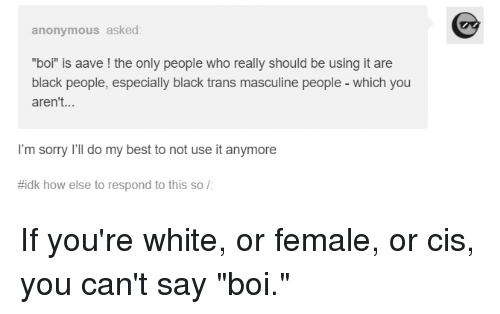
There are indeed an unsettling number of Tumblr blogs attributing the word "boi" to black culture, some even suggesting that it is an identity specific to QPoC. However, all of these claims lack citations and are of dubious veracity[4][5][6][7][8][9].
“The term ‘boi’ has firm roots in the black queer community for butches, trans men, two spirit, and masculine or male-aligned black people.”
“Although its usage across various communities is clear, there seems to be little doubt that its origins are tied directly to African American usage.”
“Unfortunately I don’t know that much about the origins of 'boi'. The most I can tell you is that it is a term created by PoC for PoC, but I don’t know for sure exactly where it originated.”
“The word “boi” is considered to be part of AAVE (African American Vernacular English), a lot of which is based in African creole dialects, so it’s considered a culturally-specific term to African Americans.”
“Considering AAVE is phonetic, “boi” seems to very obviously be a word started in QPoC communities, and then taken over by white folk.”
“Both boi & stud have etymology that traces back to colonial times, with significant ties to African Americans/POC. Based on what I know by reading, they were picked up by QPOC and then later appropriated by white queers.”
In the last example, the author presents authoritative knowledge of the subject, yet admits to having no references at hand: "I don’t have any sources at the moment but I’m sure a heap of digging would eventually bring light to something." Other authors, most of whom are not black, attempt a persuasive argument even with little or no background experience.
Wikipedia and Gender Wiki put forth equally unfounded assertions[10][11]:
Gender Wiki: “Boi... is, generally speaking, a youthful, androgynous, queer identity that originated in African American culture in the 1990s.”
Gender Wiki: “The word 'boi' originated in African American culture. It has also been taken up in Latino and Asian communities.”
Wikipedia: “The term was coined to refer to black LGBTQ people, especially black gay individuals, later being used to describe gender.”
A distinctive developmental pattern can be observed, akin to the game of telephone[12]. Each of these wikis and blogs appears to be building upon some previous source of information, further skewing and altering the original message into an extravagantly bogus soundbite.
Given the overwhelming lack of tangible evidence, beyond mere argument from hearsay, all of these claims can rightfully be dismissed[13].
- Emily Dreyfuss, "Want to Make a lie seem true? Say it again. And again.", Wired (Feb 11, 2017)
https://www.wired.com/2017/02/dont-believe-lies-just-people-repeat/ - "Confirmation Bias", Wikipedia (Captured Jun 1, 2018)
https://en.wikipedia.org/wiki/Confirmation_bias - "Know Your Sources", Portland Community College Library (2014)
https://www.pcc.edu/library/scripts/know-your-sources/index.html - peachisty, "Don't use boi if youi're not black", Tumblr (Jun 24, 2016)
http://peachisty.tumblr.com/post/146409055856/dont-use-boi-if-youre-not-black-its-aave - nonbinary-support, "I used to identify as a boi", Tumblr (Feb 26, 2017)
http://nonbinary-support.tumblr.com/post/157712990582/i-used-to-identify-as-a-boi-since-that-seemed - w2radvice, "If I'm PoC can I use the term boi", Tumblr (Aug 10, 2016)
http://w2radvice.tumblr.com/post/148760223156/if-im-poc-can-i-use-the-term-boi-or-is-it-only - genderqueerid, "Hello I once heard somebody say", Tumblr (Jun 4, 2013)
http://genderqueerid.com/post/52144260437/hello-i-once-heard-somebody-say-the-term-boi - lifeoutsidethebinary, "Thank you Jess and Micah", Tumblr (Apr 15, 2014)
http://lifeoutsidethebinary.com/post/82755180535/thank-you-jess-and-micah-that-was-helpful - strawberreli, "Clipped for Brevity", Tumblr (Jul 31, 2012)
http://strawberreli.tumblr.com/post/28465702168/clipped-for-brevity - "Boi", Gender Wiki (Dec 16, 2017)
http://gender.wikia.com/wiki/Boi - "Boi (slang)", Wikipedia (Jan 29, 2018)
https://en.wikipedia.org/w/index.php?title=Boi_(slang)&oldid=822876646 - "Chinese whispers", Wikipedia (Captured Jun 11, 2018)
https://en.wikipedia.org/wiki/Chinese_whispers - "Argument from Hearsay", Logically Fallacious
https://www.logicallyfallacious.com/tools/lp/Bo/LogicalFallacies/52/Argument-from-Hearsay
Conclusion
As documented above, there is simply no evidence to support that the word "boi" was ever the exclusive lexicon of black people, moreless an identity specific to QPoC.
To constitute appropriation, necessitates a historically violent relationship of borrowing from and benefiting from another culture by a dominant group. As such, traditional elements are stripped of their underlying significance and then exploited as a popular commodity, to the detriment of the marginalized group which is thereby mocked or ridiculed for manifesting the same traits[1].
This process of assimilation, however, is certainly not confirmed by the historical record. Based upon my research, such claims are both incredulous or presumptuous. While they might appear reasonable within a fanciful distortion of reality, ultimately they have no factual basis.
The word "boi" is and always has been a free-floating identifier, irrespective of race, ethnicity, gender, sexuality, or age. Any attempt to impose a racially-biased interpretation of boihood is to promulgate white male supremacy, further entrenching the institutional barrier between hegemonic masculinity and those who seek to dismantle such systems of oppression.
It is important that black folks have the tools to protect and preserve their culture — but not at the expense of enacting lateral prejudice toward other minorities. Self empowerment and self affirmation is a continual process of building oneself up, not needlessly tearing down others. Countering racial unjustice, however, need not be contingent on overzealous, unwarranted language policing of other marginalized social groups.
I conclude with an apt quote by Maya Angelou, a highly esteemed author whom I had the privilege of meeting in high school:
“There is a world of difference between truth and facts. Facts can obscure the truth.”
